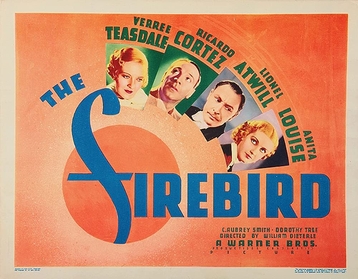
While exploring the early American films of William Dieterle, I came across a curious Stravinskyan artifact in the form of the 1934 murder mystery The Firebird. It is set in an upper-bourgeois milieu in Vienna. Ricardo Cortez, an exotically renamed son of Austrian Jewish immigrants, plays Hermann Brandt, a popular stage actor who moves into a building occupied by, among others, the well-to-do, conservative Pointers. The Pointers’ eighteen-year-old daughter is rebelling against the behavioral strictures imposed upon her, and one of her ways of acting out is to listen to a recording of The Firebird. As the “Danse Infernale” plays, the following dialogue ensues:
DAUGHTER: Mother, come listen to this! Isn’t it beautiful?
MOTHER: What is it?
DAUGHTER: The Firebird, by Stravinsky!
MOTHER: Where did you get it?
DAUGHTER: Alice gave it to me for my birthday.
MOTHER: It’s a good thing your father didn’t hear it. [Lifts needle from record.]
DAUGHTER: But, mother…
MOTHER: Darling, we don’t like you to play music of that kind.
DAUGHTER: Very well, mother.
MOTHER: If Alice’s mother doesn’t object to her playing it, well, people have different ideas nowadays. Maybe your father and I have remained old-fashioned. We feel that classical music is quite sufficient for a young girl. As for The Firebird, it’s fit only for savages.
DAUGHTER: But I don’t understand, mother…
MOTHER: You will when you’re older, darling. And don’t bother your head about it any longer.
DAUGHTER: Very well, mother.
It turns out that Brandt is also fond of The Firebird and uses it as a signal to attract a lover to his apartment. No points for guessing who this lover is. When Brandt is murdered, the local inspector must unravel the mystery, to which Stravinsky provides an important clue. The Firebird serves as the main-title theme and is heard in several other scenes. Since the music was at that time out of copyright in the United States, Warner Brothers paid no fee. I haven’t found any immediate evidence that Stravinsky was aware of the film, but perhaps it played a role in his eventual decision to prepare a new suite and thereby bring his score back under copyright protection.